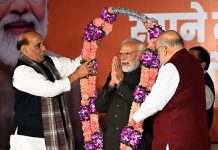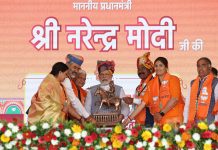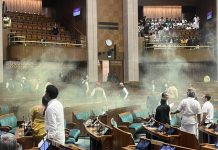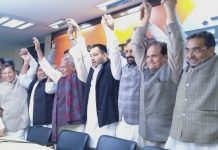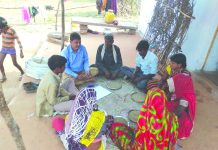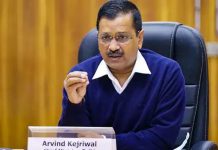 No one knew that a Supreme Court order would trigger such an upheaval that a big change will emerge on the horizon of Indian politics. This change is likely to have a big effect on 2019 polls as well. It will also reorient equations within the Dalit politics in a big way. The judgment from the bench of Justice AK Goel and Justice UU Lalit on March 20, 2018, says that the arrest of an accused in SC/ST Act is not mandatory and the initiation of action against the accused would require a preliminary inquiry and sanction by a competent authority. The court also lifted a complete bar on granting anticipatory bail in these cases.
No one knew that a Supreme Court order would trigger such an upheaval that a big change will emerge on the horizon of Indian politics. This change is likely to have a big effect on 2019 polls as well. It will also reorient equations within the Dalit politics in a big way. The judgment from the bench of Justice AK Goel and Justice UU Lalit on March 20, 2018, says that the arrest of an accused in SC/ST Act is not mandatory and the initiation of action against the accused would require a preliminary inquiry and sanction by a competent authority. The court also lifted a complete bar on granting anticipatory bail in these cases.
The court directed that in absence of any other independent offence calling for arrest, in respect of offences under the Atrocities Act, no arrest may be effected without the permission of appointing authority in case of a public servant or that of Senior Superintendent of Police in case of general public.
The court issued a five-point guideline to administer justice in the SC/ST (Prevention of Atrocities Act, 1989). The court said that there is no absolute bar against grant of anticipatory bail in cases under the Atrocities Act if no prima facie case is made out or where on judicial scrutiny the complaint is found to be prima facie mala fide.
The verdict came in a case from Maharashtra in which government authorities were punished under the Act for writing an adverse comment in the annual confidential report of a subordinate who belonged to a Scheduled Caste. The subordinate had alleged that the comment was inspired by a caste bias. Allegations of misuse have been regular after the Act came into effect in 1989. The apex court took the stand that no innocent should be punished and decided to issue the guideline.
Obviously, the verdict sparked angry reactions from the Dalit community. Political leaders and social activists joined hands to oppose the order. They demanded an immediate review of the Supreme Court order. The demand even received support from Dalit ministers in the union cabinet and MPs of the ruling BJP.
A call for Bharat Bandh on Apri 2 was given by various Dalit organizations. Though there is no clarity on who exactly decided the program and gave a call, most of the Dalit organizations except those which are affiliated to BJP came in support of Bandh. It is clear that there was no centralized meeting and none of the political parties was directly involved in it. However, the social media made it possible to spread the message across the country and the Bandh became a success. Only scar on an otherwise successful protest was that there were incidents of violence in several places and at least nine persons, mostly Dalits, lost their lives. There was a huge loss of property caused by arson and disorder. At some places, the caste conflict came into open. In Gwalior, an upper caste Hindu fired on the protesting mob that resulted in the death of a Dalit tea-seller. Even a Bharat Bandh was observed against reservation to counter the Dalit assertion. But it turned out to be a miserable flop.
The spontaneous support to the Bandh on April 2, 2018, was viewed with alarm by the ruling establishment and the Modi government rushed to the apex court for a review of the order, However, the Supreme Court denied to suspend the order and said the court was not against the Act, but It was concerned about innocent people being punished under the Act.
“We are not concerned about what is happening outside this court. Those agitating on streets may not have even read our judgment. Vested interests are also involved some time,” said the court. “We are only concerned about innocent people being put behind bars. We are not against the Act at all. But innocents can’t be punished on unilateral version. Why does government want people to be arrested without verification?” observed Justice Goel.
Obviously, the government was contradicting its own stand. It had furnished statistics of misuse and abuse of the act to the court when the court was hearing the case and the verdict was based on it. Annual reports of National Crime Bureau, on the other hand, show a fewer number of charge-sheets and poor number of convictions. Majority of the complaints fail to reach trial stage. One of the important provisions of the Act (Section 14) provides for establishment of Special Courts. However, only 194 of 700 districts in the country could get special courts for a speedy trial of the cases of atrocities.
Though the Supreme Court order was an immediate trigger for a nationwide protest, a closer look at events in the near past will reveal that protest was the result of an accumulated anger and frustration among deprived sections of the society. Some of the factors behind an increased disappointment in these communities are purely economic in nature. Soaring unemployment combined with laws unfriendly to workers has resulted in a distressed labour scenario. Some decisions of the Modi government like decrease in expenditure on social sector programs including that of MNREGA, the demonetization and the GST, has severely affected the poorer section of the society. Series of attacks on Dalits by Hindutva outfits have also sent a shockwave among the community. The community seems to be fearful of new caste-consolidation under the banners of Karni Sena, Jat Mahasabha and Maratha Kranti Morcha.
We should also not overlook the new leadership among Dalits. This leadership has proven its mettle in Gujarat elections. It is also confronting forces of conservatism at other places. The recent example is Maharshtra where they showed considerable strength in celebrating Bhima-Koregaon win of Mahar regiment under the British East India Company against the Peshwa army. While leaders like Mayawati, Ramvilas Paswan and Ramdas Athvale from the old leadership are increasingly losing their appeal, the new leadership having youngsters like Jignesh Mewani is gaining credibility.
The protest has consolidated the emerging young leadership among Dalits. Comprehending the writing on the wall, seasoned leaders like Ramvilas Paswan have started changing their stance and began criticizing the government. Paswan had criticized Bharat Bandh and said that there was no point in organizing a Bandh when the government was filing a review petition. He had met Prime Minister Narendra Modi to press for a review petition. Now, he seems to be changing his stance. He is not only criticizing the government, but also has started making alliances to secure strength in 2019 polls.
Mayawati had changed her position just few days before the trigger came in the form of SC order. She cemented her alliance with the Samajwadi Party in Uttar Pradesh and declared that she would ensure that the BJP is defeated in 2019 polls. She also said that the BSP would not be contesting any poll before 2019. This means she has insulated her party from possible opportunistic alliances in assembly polls in various states. The change of her heart was seen during and after the by-polls in Gorakhpur and Phulpur in UP when she fully supported candidates sponsored by the SP.
The change of heart is not being seen only in non-BJP parties. Even Dalit leaders are trying to go along the new wave. Most vocal among these leaders is Uditraj. Of late, he has been very critical of government policies towards Dalits. He is raising issues like increasing atrocities on Dalits.
Is the ruling BJP or its mentor RSS capable of containing this resistance from Dalits? It is hardly easy to answer. The BJP has been trying to woo Scheduled Caste and the Scheduled Tribes for long. Various outfits of Sangh Parivar are working among deprived communities. However, these efforts are creating only limited goodwill which cannot be easily translated into a political strength. Dalits cannot be placated by these measures. A new awakening is moving them towards the demand of complete freedom from the exploitation and atrocities they have been subjected for centuries. The RSS does not have such programs. It only wants reconciliation between Dalits and caste Hindus. When caste Hindus are increasingly becoming communal and casteist, how can they reconcile with oppressed communities? “This is simply impossible,” says Dr Bilakshan Ravidas, a Dalit scholar and social activist.
Can BJP mobilize the support of Dalits in 2019 polls? This is a question which has partly been answered by the poll outcomes in Gorakhpur and Phulpur. A complete answer will come in the state polls which are being held before the Lok Sabha elections. Incidents of atrocities are constantly been reported from the BJP ruled states of UP, MP and Rajasthan.
In UP, A BJP MLA is said to be involved in a case of gang-rape of a Dalit girl and murder of her father. These incidents are scaring the community. This may automatically lead to their estrangement from the party. The party does not seem to be able to hold the support it had earned during 2014 polls. The rival party, Congress, on the other hand is in an advantageous position. Its president Rahul Gandhi is gaining support among the communities by allying with the new leadership of Dalits. He has leaders like Jignesh Mewani by his side. Leaders like Mayawati are also declaring “better relationship” with the Congress. In the battle between Modi and Rahul, the latter certainly has some advantage as far as the Dalit support is concerned.
letters@tehelka.com

